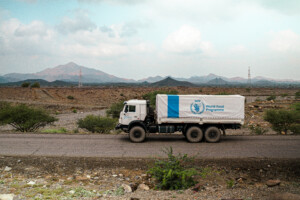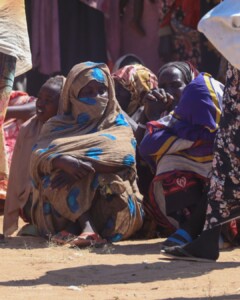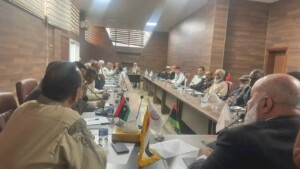Humanitarian organisations in Sudan assist 350,000 flood victims
Relief organisations have provided life-saving assistance to more than 350,000 people in Sudan who have been affected by the worst floods to hit the country in three decades. The provision of aid however is threatened by a shortage of funds.
The rains are expected to continue, the UN Office for the Coordination of Humanitarian Affairs (OCHA) in Sudan said in a press statement yesterday. More than 120 people have lost their lives, and the number of people critically affected exceeds 770,000, according to the government’s Humanitarian Aid Commission.
 Abu Hamed in River Nile state (Social media)
Abu Hamed in River Nile state (Social media)
|
Relief organisations have provided life-saving assistance to more than 350,000 people in Sudan who have been affected by the worst floods to hit the country in three decades. The provision of aid however is threatened by a shortage of funds. The rains are expected to continue, the UN Office for the Coordination of Humanitarian Affairs (OCHA) in Sudan said in a press statement yesterday. More than 120 people have lost their lives, and the number of people critically affected exceeds 770,000, according to the government’s Humanitarian Aid Commission. On September 4, the government declared a State of Emergency in the country due to the unprecedented flooding. “We are, in fact, talking about one of the worst floods since 1988, when one million houses were damaged or destroyed. We are assisting thousands of people, but the rains will probably continue, and the number of people affected could further increase over the coming days,” said Paola Emerson, Head of the UN Office for the Coordination of Humanitarian Affairs (OCHA) in Sudan. Since the beginning of the rainy season that began in central Sudan in July* this year, aid organisations supported the Sudanese government in dealing with the crisis, and provided emergency shelter and household items such as kitchen utensils to more than 150,000 people who lost everything when their houses collapsed or where washed away by floodwater. Humanitarians have also provided health services to over 200,000 people affected by the storms and critical support on water and sanitation to over 350,000, OCHA states. The quick response has been possible as UN agencies and partners, with support of its donors, prepositioned supplies to meet the most immediate needs of 250,000 people before the rains started. But the numbers exceeded all forecasts, and the government and relief organisations are now in a race against time to mobilise more funds and supplies to continue the operation. “The government is responding, and donors are coming forward. Civil society organisations are also supporting people who are in dire need of assistance. But Sudan was already facing a very difficult situation before the rains and the floods increased the need of assistance,” said Emerson. Thousands of farms have been damaged in the middle of the agricultural season, compromising the harvest and the food security of thousands of families. Access to clean water, in the middle of the COVID-19 pandemic, has been compromised. “Nearly 16,000 latrines were destroyed and the collapse of the Bout Dam hampers access to water to more than 100,000 people in Blue Nile alone,” warned the head of OCHA Sudan. Extreme weather events are a reality in the region and affect Sudan year after year. “But these shocks are becoming more frequent and unpredictable. We connect droughts with floods and this year we had the locust infestation in several countries in Eastern Africa,” said Emerson. Humanitarian organisations in Sudan are increasing operations and the support from donors is impressive. But the Humanitarian Response Plan remains underfunded. “We only received 15 per cent of the US$110 million requested for health services. This is less than half of the total received last year, when we didn’t have a COVID-19 pandemic,” she explained. The funding for water, sanitation and hygiene services, critical for COVID and floods response is also extremely low, less than 22 per cent of the total required. “If we don’t receive more support soon, we will not be able to continue our work. It means that fewer people will receive medical attention or have access to clean water and sanitation services to prevent diseases. We are running out of stocks. More is urgently needed to ensure that we do not fall short at this critical moment for the people of Sudan,” warned Emerson. * The rainy season in southern Sudan stretches from May to October. In central Sudan, including Khartoum, it usually lasts from June/July to September. Radio Dabanga’s editorial independence means that we can continue to provide factual updates about political developments to Sudanese and international actors, educate people about how to avoid outbreaks of infectious diseases, and provide a window to the world for those in all corners of Sudan. Support Radio Dabanga for as little as €2.50, the equivalent of a cup of coffee. |












 and then
and then